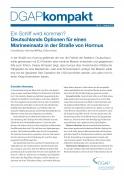Executive Summary
Since mid-July 2019, Germany has been discussing whether it should participate in a maritime mission in the Persian Gulf. At present, the Iranian government is significantly hindering free navigation in the Strait of Hormuz. The USA is reacting with massive pressure; a US-led naval mission is to follow. This situation threatens to add a new dimension to the escalating conflict between Washington and Tehran over Iran’s nuclear program and the balance of power in the Middle East.
Germany has a considerable interest in enforcing the principle of free navigation and preserving the so-called Iran Nuclear Agreement (JCPOA). Like other countries, however, it does not want to be drawn into a possible military conflict between the USA and Iran. Germany must therefore shape its commitment to German interests in such a way that also encourages Iran to continue to comply with the international obligations to which it has agreed.
The Chancellery has proposed a maritime protective mission; the Foreign Minister an observer mission. While both agree that any German mission must be carried out together with European partners, it remains to be seen what each option means in terms of its actual mandate and tasks, as well as which partners have an interest in participating and the contributions they can make – not least because the German Navy’s lack of efficiency has repeatedly been cited as a reason for not participating at all.
German Role: In order to maintain its claim to shaping foreign policy and to safeguard its interests, Germany should help develop a mission and, if necessary, lead it. European partners seem to have a general interest in participating in such a mission if a European country took the initiative. However, France, whose participation would be indispensable from a political and operational point of view, is likely to be difficult to be convinced. In Paris, disappointment at the lack of German involvement continues to grow.
Mission/Mandate: Even an observer mission can contribute to security policy as long as its mandate and rules of engagement allow for sufficient intervention in emergency situations – including the use of appropriate force for the protection of others. A mission’s mandate should also define its end state or the time at which its operations will conclude.
Military Capabilities: The naval forces of the EU countries have sufficient resources to carry out an observer mission or a protective mission. However, either such mission will take time to launch because ships and other capabilities must first be released from existing commitments. Therefore, any new operation will be at the expense of existing tasks and training. Involvement in a mission in the Strait of Hormuz would require Germany to provide that mission with the constant use of at least one ship and Europe to provide between 10 and 30 percent of its maritime capabilities, depending on its scope. Because this estimate does not take actual operational readiness into account, it is very optimistic. It therefore has to be assumed that the contribution cannot be increased at will. This insight should make it immediately clear that the resurgence of naval forces in Europe should be accelerated.
European Partners: Germany and the EU should endeavor to attract the participation of non-EU states such as Norway, Canada, Australia, or New Zealand. To legitimize any operations in the Middle East and the Persian Gulf, it would also be advisable to ask Arab or North African states to participate – even if only symbolically. In addition, Germany should encourage Great Britain to contribute a ship to an EU mission.
Dealing with the USA: Any European mission will have to coordinate very closely with the US-led initiative. But this does not mean becoming part of it. To this end, Germany should explain at the outset which rules apply to its cooperation and, if the US escalated the situation militarily, that it would terminate its cooperation.




